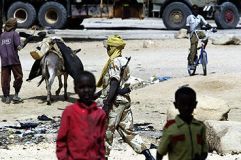Chad army chief killed in battle with rebels
Mar 31, 2006 (N’DJAMENA) — Chad’s top army general, a nephew of the country’s president, has been killed by rebel forces backed by Janjaweed militias from Sudan, military sources said Friday.

|
|
A soldier of the Chad National Army patrols the wadi Tine, the empty bed of a seasonal river that marks the border between Tine Chad and Tine Sudan, in 2004.. |
General Abakar Yusuf Itno, heading up military operations against Chadian rebels ensconced in the east of the country, was seriously wounded Thursday afternoon in clashes some 100 kilometers (60 miles) south of the border town Adre and died before he could receive medical attention, the sources said.
A day of fierce fighting between some 1,000 Chadian army regulars and a comparable number of rebel forces from the Rally for Democracy and Liberty (RDL) left 60 Chadian soldiers wounded, some seriously, said a source from an aid organization.
An RDL spokesman contacted by phone did not say whether any rebels were wounded or killed.
According to officials in N’Djamena, the rebels were reinforced by Khartoum-backed Janjaweed militias who had crossed over into Chad from the neighboring Sudanese province of Darfur. The Janjaweed have been accused of atrocities against civilians in Darfur.
Foreign Minister Ahmat Allami said Thursday that between 4,000 and 5,000 Chadians living in frontier villages have fled their homes to seek shelter from the Janjaweed horsemen.
RDL spokesman Issa Moussa — a former prefect from Chad’s eastern district of Iriba — contested the government’s version of events.
“We have been on Chadian territory for three weeks,” said Moussa, who describes himself as an advisor to RDL leader Mahamat Nour. “The Chadian army attacked us at our positions and forced us to flee.”
Thursday’s clashes came one month ahead of May 3 presidential elections, boycotted by opposition figures as rigged.
Chad condemned what it called “a new aggression” in the area of Moudeina, saying it was “a flagrant violation by the Khartoum government of the Tripoli agreements of February 8, 2006.”
The peace deal signed by Chad and Sudan under the aegis of Libya and the African Union stated they would not harbour rebels on their territories or conduct mutually hostile activities.
The agreement appeared to put an end to a months-long row during which the two countries traded accusations of destablisation attempts.
The tensions reached a peak in December after RDL rebels attacked the Chadian town of Adre, an act Chad blamed on Sudan in declaring a “state of hostility” with its eastern neighbour.
Earlier this month Chad again denounced incursions by “Sudanese militias” into its territory, and last week President Idriss Deby Itno condemned Sudan’s “material and financial” backing for the rebels.
“Sudan has fulfilled none of its promises, neither disarming the Janjaweed, nor disarming the Chadian rebels. We wonder about the validity of the declarations made in Tripoli,” Ahmat Allami said.
Humanitarian organisations say about 30,000 Chadians have been displaced since the end of December by cross-border attacks in the east of the country, where some 200,000 Sudanese refugees have sought safety after fleeing Darfur.
General Itno led another offensive against a different rebel group last week near the border town of Hadjer Marfain (Arabic for “Hyena Mountain”) after a army patrol found an encampment of 150 rebels from the SCUD (Foundation for Change, National Unity and Democracy) group.
Among the rebels, officials said, were several authors of an attempted coup against Itno on March 14.
“The action we have undertaken has ended all the disorder caused by the adventurers and uncertainty for many citizens,” the president told journalists during a tour of the battlefield after the SCUD rebel base was destroyed.
(ST/AFP)
